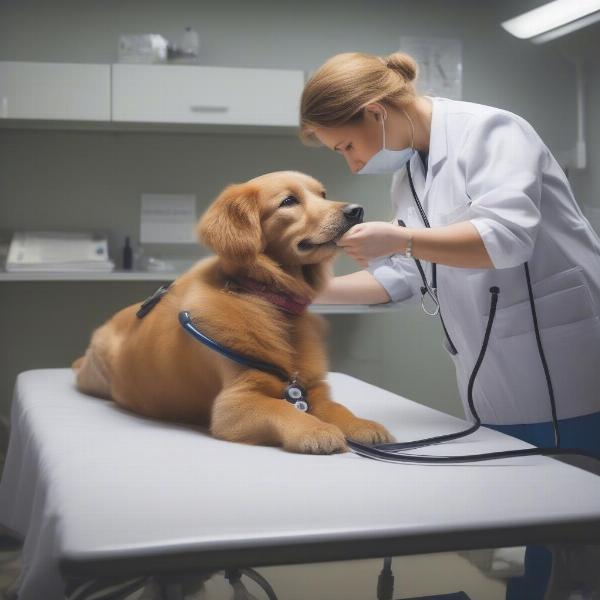Kidney failure in dogs can manifest in a variety of ways, and tremors are one potential symptom. This article will explore the link between dog tremors and kidney failure, delving into the causes, diagnosis, and management of this serious condition. Understanding this connection is crucial for pet owners to ensure their furry companions receive timely and appropriate veterinary care.
Kidney failure, also known as renal failure, occurs when the kidneys lose their ability to filter waste products and maintain a healthy balance of fluids and electrolytes in the body. This disruption can lead to a build-up of toxins, which can affect various organ systems, including the nervous system. This can manifest as tremors, which are involuntary, rhythmic muscle contractions that can range from subtle shaking to more pronounced, visible movements. While tremors can be a sign of kidney failure, it’s important to remember that they can also be caused by other conditions, such as low blood sugar, neurological disorders, or even anxiety. Therefore, a thorough veterinary examination is essential to determine the underlying cause.
What Causes Tremors in Dogs with Kidney Failure?
Several factors contribute to the development of tremors in dogs experiencing kidney failure. The primary culprit is the accumulation of waste products in the bloodstream, specifically toxins like urea and creatinine. These toxins can interfere with normal nerve and muscle function, leading to tremors. Electrolyte imbalances, particularly low calcium and potassium levels, can also exacerbate tremors. Furthermore, kidney failure can disrupt the body’s acid-base balance, leading to metabolic acidosis, which can further contribute to tremors and other neurological symptoms.
Diagnosing Kidney Failure in Dogs with Tremors
If you notice tremors in your dog, it’s crucial to seek veterinary attention immediately. The veterinarian will conduct a comprehensive physical exam and gather a detailed history of your dog’s health. Blood and urine tests are essential for assessing kidney function and identifying electrolyte imbalances.  A veterinarian examining a dog for potential kidney failure In some cases, imaging tests like ultrasound or X-rays may be necessary to evaluate the kidneys’ structure and identify any underlying abnormalities.
A veterinarian examining a dog for potential kidney failure In some cases, imaging tests like ultrasound or X-rays may be necessary to evaluate the kidneys’ structure and identify any underlying abnormalities.
Managing Tremors and Kidney Failure in Dogs
Treatment for tremors associated with kidney failure focuses on addressing the underlying renal disease and managing the associated complications. Fluid therapy is often administered to help flush out toxins and restore electrolyte balance. Medications may be prescribed to control nausea, vomiting, and other gastrointestinal symptoms that often accompany kidney failure. Dietary modifications, such as a low-protein diet, can help reduce the workload on the kidneys and minimize the build-up of waste products.
Can Tremors Be a Sign of Early Kidney Failure in Dogs?
While tremors are not always an early sign of kidney failure, they can be an indicator of worsening kidney function. Other early signs of kidney failure can include increased thirst and urination, loss of appetite, weight loss, lethargy, and vomiting. Regular veterinary checkups, especially for senior dogs, are essential for early detection and management of kidney disease.
How to Support a Dog with Kidney Failure and Tremors
Providing a comfortable and supportive environment for your dog is vital. Ensure they have a quiet, stress-free resting area and offer easily digestible, kidney-friendly food. Regular, gentle exercise can help maintain muscle strength and overall well-being. Close monitoring of your dog’s condition, including their appetite, water intake, and urination habits, is crucial for early detection of any changes that may require veterinary attention.
Dr. Emily Carter, DVM, a board-certified veterinary internist, emphasizes, “Early detection and intervention are key to managing kidney failure in dogs. If you observe any unusual symptoms, including tremors, don’t hesitate to consult your veterinarian.”
Professor John Davies, a leading expert in veterinary nephrology, adds, “While tremors can be distressing, it’s important to remember that with appropriate management, many dogs with kidney failure can enjoy a good quality of life.”
In conclusion, tremors can be a concerning symptom in dogs, especially when linked to kidney failure. Prompt veterinary diagnosis and treatment are crucial for managing this condition and ensuring your dog’s comfort and well-being.
FAQ
- Are tremors always a sign of kidney failure in dogs? No, tremors can be caused by a variety of conditions, including neurological disorders, low blood sugar, and anxiety.
- What other symptoms might accompany tremors in a dog with kidney failure? Increased thirst and urination, loss of appetite, weight loss, lethargy, and vomiting are common symptoms of kidney failure.
- How is kidney failure diagnosed in dogs? Blood and urine tests, along with imaging studies, are used to diagnose kidney failure.
- Can kidney failure be cured in dogs? While there’s no cure for kidney failure, it can be managed with appropriate treatment and dietary modifications.
- What is the prognosis for dogs with kidney failure? The prognosis varies depending on the severity of the disease and the individual dog’s response to treatment.
- How can I make my dog comfortable during kidney failure? Provide a quiet, stress-free environment, offer easy-to-digest food, and ensure regular, gentle exercise.
- What should I do if I notice tremors in my dog? Contact your veterinarian immediately for a thorough examination and diagnosis.
ILM Dog is a leading international pet website dedicated to providing reliable and practical information on dog care and wellbeing. We cover a wide range of topics, from breed selection and puppy care to senior dog health and travel tips. Our expert advice on dog health, nutrition, training, and grooming will help you provide the best possible care for your furry friend. For personalized advice and further information, please contact us at [email protected] or +44 20-3965-8624. ILM Dog is your trusted partner in ensuring your dog’s health and happiness.